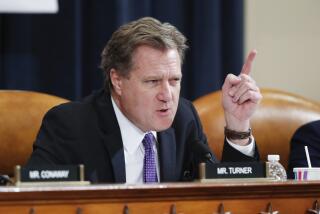The System Takes Heat for Possible Transfer of Secrets
- Share via
WASHINGTON — Although the congressional report on Chinese espionage singled out two U.S. aerospace giants for passing along sensitive information after a trio of satellite explosions in recent years, there appears to be plenty of blame to go around for high-technology security breaches.
The scathing report from the committee headed by Rep. Christopher Cox (R-Newport Beach) declared that procedures for keeping sensitive technology on satellites and rockets out of foreign hands have not worked, in part, because firms that do business overseas have “an inherent conflict of interest” in following the rules.
And in the recent U.S. satellite technology, lawmakers found that a Commerce Department official improperly authorized El Segundo, Calif.-based Hughes Space and Communications International to discuss certain data with the Chinese.
In addition, Commerce Department-issued licenses for the export of the three satellites did not require that a monitor from the Defense Department be on hand to prevent an exchange of information and technology that could benefit China’s military.
Such findings could bolster the defense of officials at Hughes and Loral Space & Communications Ltd., a New York-based satellite manufacturer--especially if the aerospace firms end up facing criminal charges for allegedly passing technology to China.
A Justice Department official declined to comment Tuesday on the status of its investigation into whether either company violated export laws governing the transfer of technology.
The two firms said they never sought to hide their assistance to the Chinese following the rocket crashes. Indeed, the Cox report pointed out that the review into Loral’s technology transfer was triggered in 1996 after a Defense Department analyst read about it in an industry publication called Space News.
Such cases are notoriously difficult to prosecute, said John L. Martin, former head of the Justice Department section that prosecutes national security cases.
“Generally, the transfer of technical data is a much more difficult case than the transfer of a technical device or something more tangible,” he said. “You literally have to catch them red-handed.”
Moreover, he said, it is tricky to show that a company that had an export license in a certain area--as Hughes did--exceeded the limits of that authorization or knew how the technical data might be used overseas.
Nevertheless, one executive at Loral said the company has been served over the last year with numerous subpoenas for documents related to the Justice Department’s investigation.
“We’ve turned over absolutely every shred of documents we have,” the executive said.
The investigation grew out of the destruction of three communications satellites, two bought by the Chinese from Hughes and the third from Loral, from 1992 to 1996. The satellites were carried by Chinese Long March rockets that crashed and exploded within seconds of liftoff, dashing with them China’s great hopes of expanding its global communications network.
After the crashes, Hughes and Loral worked with the Chinese to determine what went wrong, probing with questions over whether the satellites or the rockets caused the failures.
Cox’s committee charged that the firms went too far in their technical assistance, providing banned information to the Chinese without proper authorization.
Instead of getting the government licensing necessary to share that information, thereby risking delay or rejection of their actions, the firms made the “deliberate decision” to bypass proper channels, the report concluded. And Loral, warned that it needed a license to provide guidance-system assistance to China, “took no action,” the report found.
Just how China has used the technical assistance provided by Hughes and Loral remains uncertain. But the committee charged that the data could aid China in the development of intercontinental ballistic missiles and other military technology.
“When Loral and Hughes assisted [China], they could not know whether [China] would in fact use such information in their military programs,” the report concluded.
Citing company memorandums and interviews, the Cox report sought to show that national security was secondary to corporate interests at Hughes and Loral.
The report cited a 1995 memo from a Hughes senior vice president that said: “We cannot allow this accident to damage our relationships in China--or anywhere else in the world--especially in view of several near-term satellite and regional service opportunities.”
But officials at Loral and Hughes said Tuesday that any improper transfers were, at worst, inadvertent, and that they are confident they can defend themselves against potential criminal charges from the Justice Department.
“Hughes is going to be exonerated. We followed the procedures of the [U.S.] agencies in charge,” said Hughes spokesman Richard Dore. “Now the question is, were the procedures the proper procedures? In retrospect, the Cox committee is showing there may have been a problem with the process.”
Some of the procedures criticized in the report have been altered since the controversy surfaced. Most notably, in an effort to ensure that national security interests are weighted more heavily than U.S. business interests, Congress transferred control of satellite exports from the Commerce Department to the State Department.
More to Read
Inside the business of entertainment
The Wide Shot brings you news, analysis and insights on everything from streaming wars to production — and what it all means for the future.
You may occasionally receive promotional content from the Los Angeles Times.







